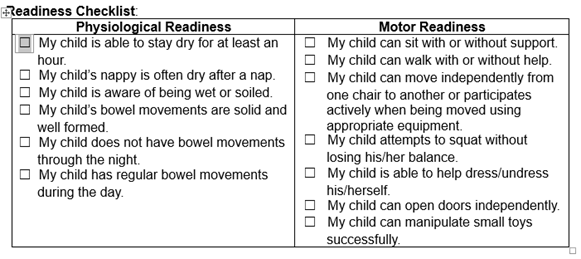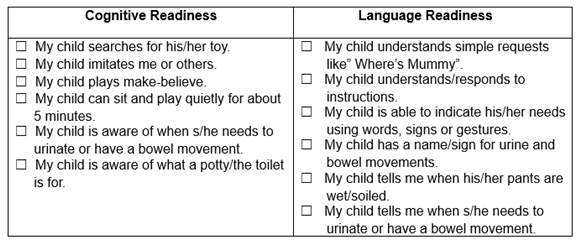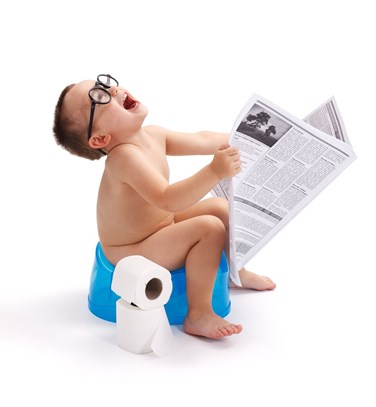
There is no set age at which potty training or toilet training should begin. The right time depends on your child’s development in the following four areas;
Let’s take a look at each area
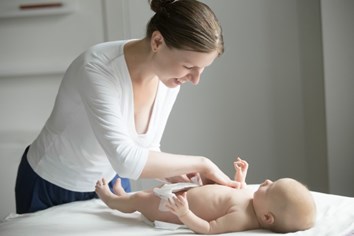 Babies’ bladders are unstable and, as a result, empty frequently with residual urine.
Babies’ bladders are unstable and, as a result, empty frequently with residual urine.Depending on whether bottle or breastfed, the expected number of bowel movements per day can vary from three to five times per day at age one month, for a bottle fed baby, to two to three times per week for a breast fed baby.
Most babies stop opening their bowels at night before they become one year old.
Expected bowel movements in a child should range from no more than three times a day to no less than three times a week.
Soiling at night above age one year may be an indication of constipation.
Physiological readiness however, does not always mean your child is ready to toilet train. Motor, cognitive & verbal, emotional & social skills are all important partners in the process.
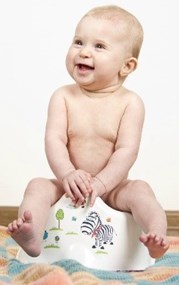
The average child spends much of the first couple of years of their life mastering the skills for sitting independently, learning to move around the floor, walking and running. They move on to develop the fine motor or hand/eye coordination skills necessary for dressing and undressing and manipulating toys in readiness for the acquisition of other skills.

The potty training process is a complex combination of physical and cognitive tasks. Your child has to learn and become familiar with his/her body and functions, associate the physical sensation with the proper response, picture what s/he wants to do, create a plan to get to the potty, get there, pull down clothing then use the potty. S/he then has to remain there long enough to finish which requires memory and concentration.
The instructions you provide for this process must also be understood by your child and they must be able to respond to your commands.
The process starts with body awareness and the ability to associate a feeling of fullness with the result i.e. a bowel movement or urination. This association does not occur automatically and must be reinforced by you telling your child what is happening based on your observations.
Around age two children become aware of and learn the names of body parts. Teaching the words that are used by your family you can introduce the words that are necessary for toilet training. The next stage of the process involves your child being able to use symbolic thought, planning and problem solving skills and memory. Your child must learn to recognise the need to go to the potty, stop whatever they are doing, find their way to the potty and use it.
This is probably the hardest to gauge. The components that will help you to determine your child’s social and emotional readiness are self mastery, the “I can do it” phase, the desire for approval - “I’m a big girl/boy now” and general social awareness. Sometimes the need to control one’s own body and environment are manifested in undesirable ways such as hiding when s/he has the urge to have a bowel movement, or having an “accident” for the sheer satisfaction of making the decision about where to do it or withholding the stools, which can lead to constipation. When your child is in this phase, back off and try again later.
The desire for approval can be a very useful tool during potty training. Children have a very strong desire to please their parents at this stage. Social awareness is the ability to observe others and have a desire to be like them. At the age of 18mths or so children are fascinated by the behaviour of children their own age or older. By 24-36mths they begin to understand gender differences and focus on imitating the behaviour of the same sex parent.
Children with additional needs such as Learning Difficulties and/or Physical Difficulties can be toilet trained using the approaches and base line measures outlined above however they may begin the process at a later stage, will often need longer to develop and consolidate their skills and require the components of each part of the process to be broken down further into smaller chunks of learning. Children with physical limitations can acquire bladder and bowel control in the absence of the movement skills needed to make their own way to the toilet or to complete all of the personal care aspects of the process. Special equipment is sometimes needed to transfer them on/off the toilet, to provide them with a safe and comfortable position on the toilet, and to clean and dry them afterwards. In some instances children will require to be changed on a height adjustable changing plinth.
Children with learning difficulties may have their learning enhanced by the use of picture prompts which compliment clear verbal cues when they are mastering the sequence involved.
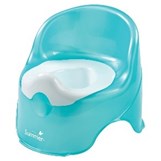 There are many different skills and factors involved in the process of being able to go to the toilet independently. In order for a child to achieve success there needs to be cohesion between these skill areas.
There are many different skills and factors involved in the process of being able to go to the toilet independently. In order for a child to achieve success there needs to be cohesion between these skill areas.
Children usually develop ability in these areas, gradually, during their infant years but sometimes problems arise which delay the acquisition of skills and at these times it can be useful to know
There are some key points to consider before embarking on a toileting programme or tackling independence issues:
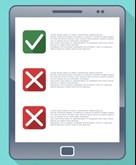
Your child's readiness to toilet train is related to his or her level of growth and development. The following items are arranged according to physiological, motor, cognitive and language development and social skills. Some of the items on the list may not apply to your child. The more items that do apply, the more ready your child is likely to begin toilet training.
